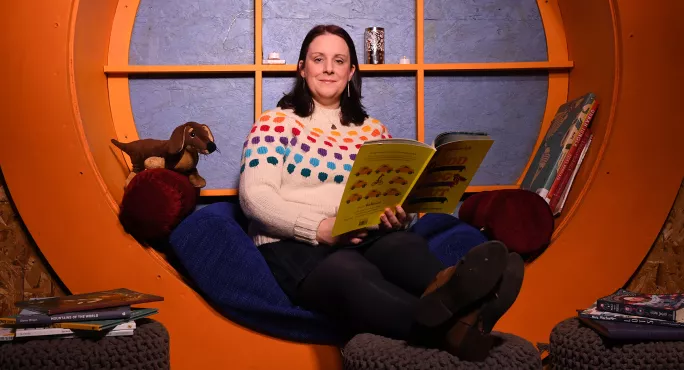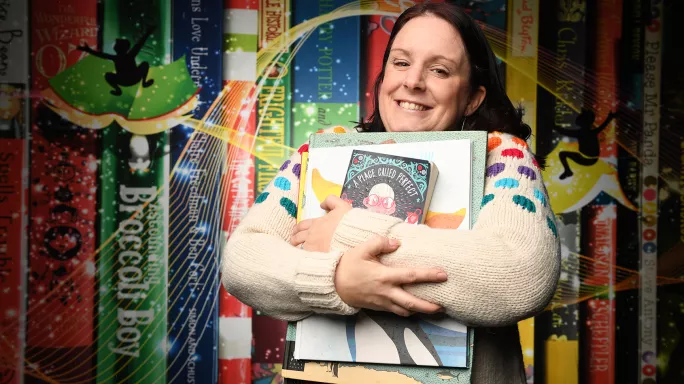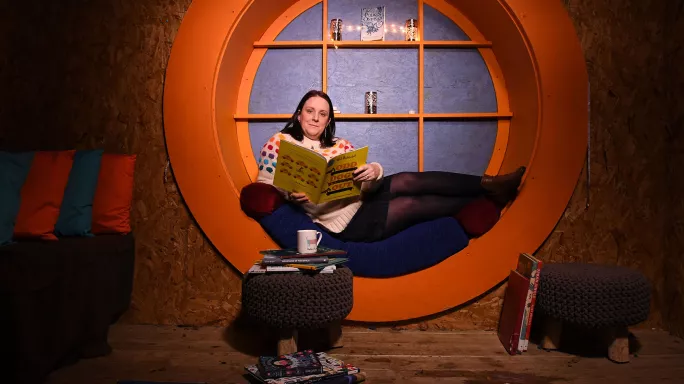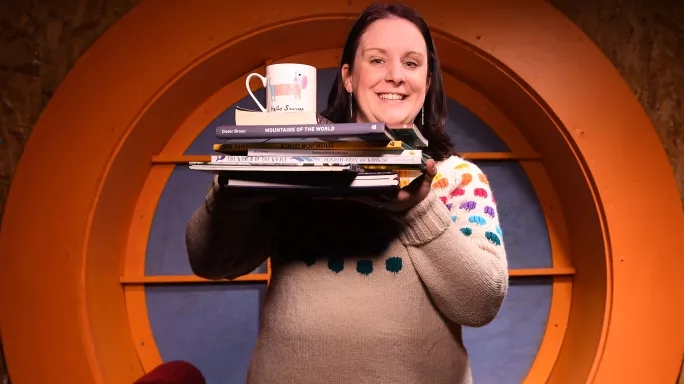- Home
- Meet the teacher who is making reading rock
Meet the teacher who is making reading rock

Heather Wright is the primary teacher who started a reading revolution from her classroom in St Helens.
As the woman behind Reading Rocks – a Twitter account, blog and series of conferences about teaching reading for pleasure – she regularly addresses hundreds of teachers and works with authors, illustrators and academics to create events. She has been named one of the most influential people in education by Tes.
But she admits that she feels most at home when she closes her Year 5 classroom door at The District CE Primary School and starts to teach.
“I love to keep a foot in the classroom,” she says. “I love teaching. I love being in that room with the children.”
Quick read: Don't interrupt reading with questions, says Ofsted
Quick read: Tes People of the Year - Heather Wright
World Book Day: Six last-minute World Book Day costumes
Wright, 36, who is also The District school’s key stage 2 team leader and English lead, admits that she was “totally shocked, gobsmacked and really, really honoured” to be named one of the most influential people in education in 2018 by Tes. “I was on a list with a Baroness [Mary Warnock],” she exclaims. “And a robot.”
But although Reading Rocks is celebrated for its focus on the joy of teaching, Wright is clear-headed about the challenges that schools face and the serious message behind reading for pleasure.
“Budgets are hard in schools and some schools see author visits as a luxury. I feel like, you know what, they’re really vital to give children those experiences and aspirations, especially in schools in deprived areas,” she says.

And she well remembers quite how uninspiring it can be when you are given reading "to do".
Wright was born and brought up in Liverpool with her older brother, Tim. Her mum, Aileen, was a pharmacy technician and her dad, Neil, was a computer programmer. Both are now retired.
Wright went to Anfield Road County Primary and remembers being given five or 10 pages of a book to read as homework – something she saw as a chore.
Her secondary was Archbishop Blanch School, a Church of England girls’ school, which she left with A levels in art, biology and PE.
Make reading time sacrosanct
But it was not so much her school, as her church, Ebenezer Chapel in Walton, which influenced her decision to go into teaching.
Wright describes herself as a shy child, but she still had to sing in church – and remembers pushing through the nerves to do so. Now she credits that experience for her ability to stand up in front of 200 people and open a conference.
As a teenager, she also regularly led Sunday school groups. “I have been lesson planning since I was 16,” she jokes.
After Archbishop Blanch, Wright went to Liverpool Hope University to do a BA with QTS, with a specialism in art. Her first job was at The District CE primary, in St Helens, where she has remained, taking on different roles, promotions and projects.
Wright’s number one rule when it comes to encouraging primary school children to be real readers is to make reading time sacrosanct.
The school curriculum requires some books to be analysed in detail during English lessons – but then there are also the books that are read aloud for the sheer enjoyment of hearing the story. Wright chooses to read to her class in the 15 minutes before lunch. Reserving that time shows children that reading is a priority – leaving the class book until the end of the day risks it being seen as an afterthought, which can be dropped if the day is too busy.

At the moment, she is reading her class A Place Called Perfect by Helena Duggan. Other favourite books for reading aloud include Odd Dog Out by Rob Biddulph and the classic Farmer Duck by Martin Waddell for younger children. She loves When the Mountains Roared by Jess Butterworth and Sorrowline by Niel Bushnell for junior children.
And then there is The Lost Words by Robert Macfarlane and Jackie Morris, a book containing words describing the natural world, such as "conker" and "kingfisher", which had been left out of the 2007 version of the Oxford Junior Dictionary. The book has become a phenomenon in primaries with crowd-sourcing campaigns being run around the country in order to buy it for schools.
“They’re poems, but they call them spells,” Wright says. “And the artwork is stunning.
“There is something special about that book.”
A hand-delivered golden ticket
Reading aloud is just one of the ways in which Wright promotes a love of books. Reading Rocks grew out of a Year of Reading project that Wright ran at The District school in 2014-15.
The project was launched in the wake of a disappointing Ofsted report. The 350-pupil school, where 44 per cent of children have been eligible for free school meals in the past six years, was judged as "requires improvement" in June 2014. Inspectors noted that standards in reading were close to the national average in Year 2 but had fallen behind by Year 6.
Wright had the idea of “drenching the children in reading” by running a Year of Reading with an event every month – kicking off in September with a big bedtime story.
Every child was invited to the event with a golden ticket, hand-delivered to them by one of the office staff.
The big bedtime story was due to be held on the field at the back of school – children were told to come in PJs, with a book, and bring parents, grandparents, brothers and sisters. A local supermarket had donated hot chocolate and marshmallows.
Wright expected about 50 people to come. Then 200 signed up. “I thought I’d better get some more hot chocolate,” Wright says.
On the day, families arrived with their picnic blankets and chairs, children read books, books were brought out of school, a book stall was set up. And the year began.
Bring in the book bunnies
Later events included bringing an author in to work with children as a "patron of reading" – something that has continued since – visiting book bunnies (actual real rabbits) for the children to read to and reinstating two school libraries (one for key stage 1 and one for key stage 2).
Wright started sharing the work being done on Twitter and attracted further attention when the project won the 2015 Innovation Award in the regional Educate awards. The following year, the school was shortlisted in the Tes Schools Awards for English team of the year.
Ofsted was also impressed. In June 2016, the school was inspected and judged as “good”. The Year of Reading was “significant” in the school’s improvement, inspectors said.

And so came the first Reading Rocks conference, which took place in The District CE Primary in October 2016. Professionally, all was running smoothly, but personally, it came at a hard time for Wright. Two days before the conference, her mother-in-law died. Her husband, Andrew, who had been in Yorkshire by his mother’s bedside, rang to tell her and told Wright that she must carry on with the conference. Understandably, she spent that first event “in a bit of a daze” but it proved a success. And when tickets for the second conference went on sale the following year, they sold out in just 45 minutes.
The conferences have now taken place around the country, with innovations such as an after-school pop-up event at a school in Birmingham and the inclusion of events for secondary teachers at the forthcoming Reading Rocks Goes to Uni at Liverpool John Moores University on 30 March.
Wright is also working on a wishlist of authors that she would like to speak at the events, including the current children’s laureate Lauren Child, award-winning illustrator Rob Biddulph, and celebrated poet and author Michael Rosen – who is one of her 21,000-plus followers on Twitter.
Being a teacher is more than just a job
Wright’s success is partly due to the rise of social media. Not only does Twitter enable her to share what she’s doing, but she has also connected teachers, authors and researchers, who share their ideas to make reading rock.
She suspects that part of the attraction of the Reading Rocks conferences (and similar groups such as Primary Rocks and Brew Ed) is as much about meeting Twitter friends in real life as meeting favourite authors or illustrators.
But while it can be fun, it is also work. And with teachers’ workload now larger than ever, why does she think so many want to spend their precious free hours learning about writing genres?
“In education, you can feel controlled,” Wright says. “You are told what hoops to keep jumping through… This is what people want to do for their own professional development.”
And so Reading Rocks is, in fact, a kind of gentle rebellion. A very teacher-ly rebellion in which you do extra homework because you are genuinely interested in the subject. And because you are genuinely interested in the subject, that homework is not a chore but it becomes fun, creative and fulfilling.
Or, as Wright perfectly sums it up. “I always feel, as a teacher, it is never just a job. It is part of who you are.”
Heather Wright: CV
Education: Anfield Road County Primary School, Liverpool. Archbishop Blanch School, Liverpool
2004: Graduated from Liverpool Hope (BA primary education/fine art with QTS)
2004 onwards: The District CE Primary School, St Helens: teacher, key stage 2 team leader, English lead
2014: Runs Year of Reading project in The District School
2015: Year of Reading project wins Innovation in Education Award at The Educate Awards
2016: Organises first Reading Rocks event at The District School, and is shortlisted for Tes English team of the year
2018: Further Reading Rocks events around the country
2018: Named one of Tes' top 10 most influential people in education
Register with Tes and you can read two free articles every month plus you'll have access to our range of award-winning newsletters.
Keep reading with our special offer!
You’ve reached your limit of free articles this month.
- Unlimited access to all Tes magazine content
- Save your favourite articles and gift them to your colleagues
- Exclusive subscriber-only stories
- Over 200,000 archived articles
- Unlimited access to all Tes magazine content
- Save your favourite articles and gift them to your colleagues
- Exclusive subscriber-only stories
- Over 200,000 archived articles



